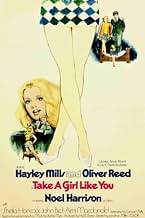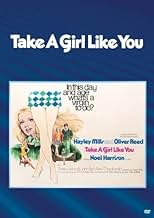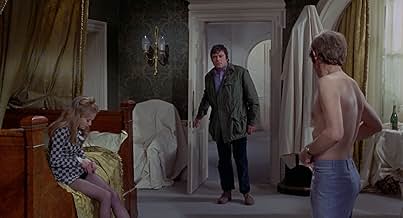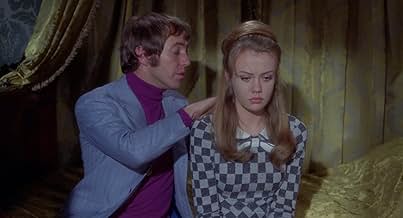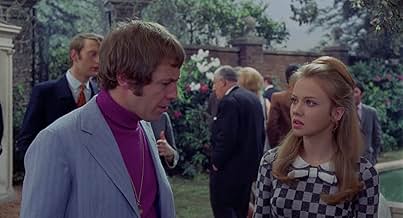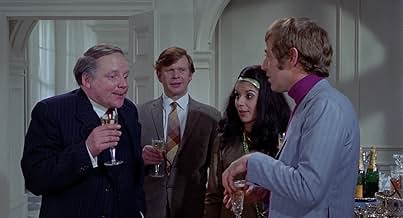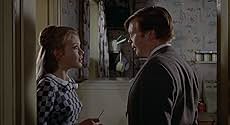Young teacher Jenny Bunn arrives in Southern England. She attracts attention from local boys, including Patrick Standish. Multiple suitors emerge, vying for her affection as she navigates he... Read allYoung teacher Jenny Bunn arrives in Southern England. She attracts attention from local boys, including Patrick Standish. Multiple suitors emerge, vying for her affection as she navigates her new life and career.Young teacher Jenny Bunn arrives in Southern England. She attracts attention from local boys, including Patrick Standish. Multiple suitors emerge, vying for her affection as she navigates her new life and career.
Aimi MacDonald
- Wendy
- (as Aimi Macdonald)
- Director
- Writers
- All cast & crew
- Production, box office & more at IMDbPro
5.6837
1
2
3
4
5
6
7
8
9
10
Featured reviews
Carry On Chastity
Take a girl like Hayley Mills, Britain's professional virgin for much of her career, and so who better to play the part of Jenny Bunn, the new girl in town who has yet to have her cherry popped. Barely has she got out of the taxi before she's accosted by local lothario Patrick (Oliver Reed), slavering at the chops at the prospect of fresh meat. He's as slimy as slime can be but you wonder if the (male) writers see him this way, or whether they regard him as a kindred spirit. The narrative proceeds along a familiar will-she, won't-she path, with less than hilarious consequences.
You don't really expect Dr Jonathan Miller, Kingsley Amis and George Melly to come up with a feminist tract, but you'd think they would be capable of producing better dialogue rather than the terrible twaddle they peddle here; e.g. "don't blow your cool over Patrick, dinner will be groovy". To add to the grief there's the usual line-up of British 'character actors' hamming it up like mad, turning it into a kind of Carry On Chastity, but without the laughs. The source novel by Amis was written in the 50s but the film, made in 1970, updates this only stylistically. It didn't seem to occur to anyone that this would make it seem even more anachronistic than it was when the story was first published
You don't really expect Dr Jonathan Miller, Kingsley Amis and George Melly to come up with a feminist tract, but you'd think they would be capable of producing better dialogue rather than the terrible twaddle they peddle here; e.g. "don't blow your cool over Patrick, dinner will be groovy". To add to the grief there's the usual line-up of British 'character actors' hamming it up like mad, turning it into a kind of Carry On Chastity, but without the laughs. The source novel by Amis was written in the 50s but the film, made in 1970, updates this only stylistically. It didn't seem to occur to anyone that this would make it seem even more anachronistic than it was when the story was first published
Not many people seem to like this
Not many people seem to like this film and it maybe that Hayley Mills seemed rather young for her age at 24 because of course she had been a child actor. But also the film had been a book by Kingsley Amis ten years earlier and things were changing fast at the time. I still liked it though even if it is rather odd for Mills and Oliver Reed to be thinking of having sex as if they were not quite as young as they thought. Both are very good and even if some of those around her are really strange, like John Bird as a Labour MP and Sheila Hancock seems completely lost, although Rex Harrison's son Noel is rather splendid. Jonathan Miller had previously directed on TV the wonderful Alice in Wonderland (1966) and George Melly had written previously Smashing Time (1967) which would have been more appropriate for the time.
Critical and Commercial Flop- And I Can Understand Why
Following an unhappy love affair, Jenny Bunn, a pretty twenty-year-old, moves from her home town in the North of England to work as a primary school teacher in a Home Counties dormitory town near London in order. Most of the plot revolves around Jenny's relationship with her 30-something boyfriend Patrick Standish, and around their contrasting moral values. Jenny holds firmly to the traditional view that a girl should remain a virgin until marriage. Patrick takes a much more permissive view of love and sex. The central issue is essentially whether Patrick will be able to get Jenny into bed with him, and whether he will be able to do so without having to marry her. (He has no interest in getting married, to Jenny or anyone else, but he is very interested in having sex with her).
Kingsley Amis' novel was published in 1960, a few years before it became fashionable to talk about the "permissive society". Nevertheless, there was already a feeling in certain quarters that society ought to become a good deal more permissive, at least where sex was concerned, than it already was, and that values like Jenny's were becoming increasingly old-fashioned and outdated. Patrick was the main representative of this viewpoint in the novel, but he was far from being the only one. Jenny's good looks meant that she had to fend off attempted seductions not only from Patrick but also from her sleazy middle-aged landlord Dick Thompson, from Patrick's Scottish flatmate and teaching colleague Graham, from Julian Ormerod, another friend of Patrick, and even from her own female flatmate Anna Le Page.
The film makes a few differences to Amis's plot. Patrick, a master at a public school in the original, here becomes a lecturer at the local technical college. Graham and Anna play less important roles here than they did in the book, and Julian a more important one. Julian is clearly wealthy, and tries to live the lifestyle of a country gentleman, but the source of his wealth remains a mystery, and there is a hint that it may not be entirely above board. In the book he is older than Patrick, but here they are around the same age.
The film transfers the action from the early sixties to the end of the decade. Several other reviewers make the point that the British moral climate had changed considerably between 1960 and 1970 and complain that the film did not really reflect this change. There may be some truth in that, but there wouldn't have been much of a film if there was no more to it than "Patrick wants to sleep with Jenny. Jenny is happy to sleep with Patrick. The End". In any case, there were probably still plenty of girls in 1970 who wanted to save their virginity until their wedding night, even if not quite as many as there had been in 1960.
Amis's novel does not have a great deal of plot, being more concerned to draw a social-realist picture of a particular place at a particular time, a small town in the South of England in the early sixties. This makes it a difficult novel to adapt for the screen, and George Melly's script is not a very interesting one. The cast features some well-known figures from the British acting profession, but none of them make much impression, except perhaps for Sheila Hancock as Dick's cynical, long-suffering and sharp-tongued wife Martha.
Oliver Reed as Patrick is too crude; Amis's character may have been a cad, but he was also handsome, intelligent and charming enough to persuade Jenny to stick with him despite his obvious lack of principles. Reed is charmless enough to make her run a mile. Hayley Mills as Jenny is rather dull; she was never to have as much success in adult roles as she had had as a child or as a teenager. And Ronald Lacey as Graham should have won a special BAFTA for "Worst Attempt at a Scottish Accent"; if they couldn't have found a Scottish actor to take the part, they should have rewritten the script to make Graham English.
This was the only feature film to be directed by Jonathan Miller. Miller had already become known for directing television dramas such as a version of "Alice in Wonderland" and the M R James adaptation "Whistle and I'll Come to You", and was later to direct many theatrical and operatic productions, so I was surprised to learn that "Take a Girl Like You" was his only excursion into the world of the cinema. Perhaps he was dissuaded from any further such ventures by the film's lack of success; it flopped both with the critics and at the box office. Having seen it, I can well understand why. 4/10.
Kingsley Amis' novel was published in 1960, a few years before it became fashionable to talk about the "permissive society". Nevertheless, there was already a feeling in certain quarters that society ought to become a good deal more permissive, at least where sex was concerned, than it already was, and that values like Jenny's were becoming increasingly old-fashioned and outdated. Patrick was the main representative of this viewpoint in the novel, but he was far from being the only one. Jenny's good looks meant that she had to fend off attempted seductions not only from Patrick but also from her sleazy middle-aged landlord Dick Thompson, from Patrick's Scottish flatmate and teaching colleague Graham, from Julian Ormerod, another friend of Patrick, and even from her own female flatmate Anna Le Page.
The film makes a few differences to Amis's plot. Patrick, a master at a public school in the original, here becomes a lecturer at the local technical college. Graham and Anna play less important roles here than they did in the book, and Julian a more important one. Julian is clearly wealthy, and tries to live the lifestyle of a country gentleman, but the source of his wealth remains a mystery, and there is a hint that it may not be entirely above board. In the book he is older than Patrick, but here they are around the same age.
The film transfers the action from the early sixties to the end of the decade. Several other reviewers make the point that the British moral climate had changed considerably between 1960 and 1970 and complain that the film did not really reflect this change. There may be some truth in that, but there wouldn't have been much of a film if there was no more to it than "Patrick wants to sleep with Jenny. Jenny is happy to sleep with Patrick. The End". In any case, there were probably still plenty of girls in 1970 who wanted to save their virginity until their wedding night, even if not quite as many as there had been in 1960.
Amis's novel does not have a great deal of plot, being more concerned to draw a social-realist picture of a particular place at a particular time, a small town in the South of England in the early sixties. This makes it a difficult novel to adapt for the screen, and George Melly's script is not a very interesting one. The cast features some well-known figures from the British acting profession, but none of them make much impression, except perhaps for Sheila Hancock as Dick's cynical, long-suffering and sharp-tongued wife Martha.
Oliver Reed as Patrick is too crude; Amis's character may have been a cad, but he was also handsome, intelligent and charming enough to persuade Jenny to stick with him despite his obvious lack of principles. Reed is charmless enough to make her run a mile. Hayley Mills as Jenny is rather dull; she was never to have as much success in adult roles as she had had as a child or as a teenager. And Ronald Lacey as Graham should have won a special BAFTA for "Worst Attempt at a Scottish Accent"; if they couldn't have found a Scottish actor to take the part, they should have rewritten the script to make Graham English.
This was the only feature film to be directed by Jonathan Miller. Miller had already become known for directing television dramas such as a version of "Alice in Wonderland" and the M R James adaptation "Whistle and I'll Come to You", and was later to direct many theatrical and operatic productions, so I was surprised to learn that "Take a Girl Like You" was his only excursion into the world of the cinema. Perhaps he was dissuaded from any further such ventures by the film's lack of success; it flopped both with the critics and at the box office. Having seen it, I can well understand why. 4/10.
4BOUF
Reading Kingsley Amis's original novel is probably a better option
The opening titles (in funky 1970 font) are accompanied by the Foundations singing the title song, the hook of which sounds a lot like "Fly Me To The Moon" (aka "In Other Words"). If this film were set when Kingsley Amis, the novelist, set it, and when "Fly Me To The Moon" had its first success (mid-1950s) it might work better. Transposing the action to the dog-end of the swinging 60s is an awkward fit for a story about a young woman who comes from the North of England to a dull Southern town, and is determined to cling to her virginity, rings slightly false, but that's not the only problem. It's a curiously lifeless mix of sketch-comedy turns and a soapy boy-meets-girl sequences which never quite gels. Oliver Reed seems to be on automatic, Sheila Hancock is wasted, Noel Harrison is creepy, but Hayley Mills, despite being slightly too old for the central role of the girl is such a positive force, that every time she's on screen she almost saves this plod. She is a brilliant actress and an inspirational human being - at least that's the vibe I get from her performance in this pale adaptation of a very funny novel.
A Disaster
Based on Kingsley Amis's 1960 novel, everything about this travesty is rendered hideously dated by it having actually been made at the wrong end of the sixties during that fleeting era when Hayley Mills & Noel Harrison were considered bankable stars; and well and truly put Jonathan Miller off ever getting involved with the film industry again.
Amis's contempt both for the permissive society and for women in general, alas, comes through loud and clear. And why Oliver Reed is so charmlessly set on bedding the virginal Hayley when the lovely Aimi MacDonald is all over him is one of several uninteresting mysteries the film presents us with, such as how - with the possible exception of Sheila Hancock - such a good cast is ill-used.
Amis's contempt both for the permissive society and for women in general, alas, comes through loud and clear. And why Oliver Reed is so charmlessly set on bedding the virginal Hayley when the lovely Aimi MacDonald is all over him is one of several uninteresting mysteries the film presents us with, such as how - with the possible exception of Sheila Hancock - such a good cast is ill-used.
Did you know
- TriviaThis is the only theatrical movie directed by Jonathan Miller.
- GoofsThe opening title sequence shows a train. It is hauled by a BR Class 47 diesel loco. The first carriage is BR Mk1 full brake. The next scene is that of a train pulling into a station. This train is though is hauled by a BR Class 35 diesel (smaller than a 47). The first carriage is now a BR Mk1 composite brake.
- Quotes
Martha Thompson: My old man made a pass at you yet? Not to worry, he will. Just give him a kick in the crotch.
- ConnectionsReferences Come Dancing (1949)
- SoundtracksTake A Girl Like You
Composed by Bill Martin and Phil Coulter
Sung by The Foundations
[Title song played during the opening credits, and again in the lead up to the end credits]
- How long is Take a Girl Like You?Powered by Alexa
Details
- Release date
- Country of origin
- Languages
- Also known as
- Senin Gibi Bir Kız
- Filming locations
- The George Inn, 29 Windsor Road, Wraysbury, Staines-upon-Thames, Surrey, England, UK(Jenny, Graham, Anna and Patrick meet Wendy at the pub)
- Production company
- See more company credits at IMDbPro
- Runtime
- 1h 41m(101 min)
- Aspect ratio
- 1.33 : 1(original ratio)
Contribute to this page
Suggest an edit or add missing content


